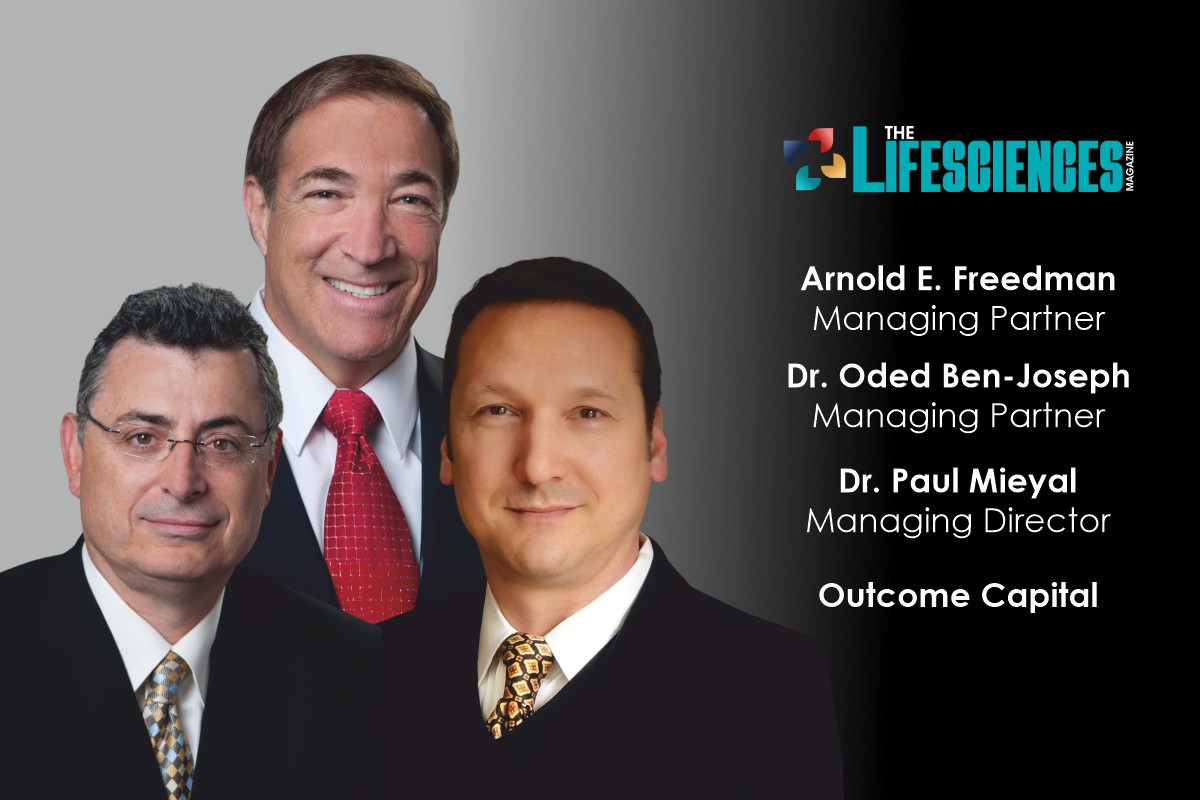The life sciences industry is extremely complex with value drivers extending far beyond financial metrics, and hence, facilitating transactions demands more than traditionally formulaic investment banking approaches. Outcome Capital is combining extensive scientific and operational knowledge with financial expertise to help life sciences and healthcare companies with their strategic initiatives. Outcome’s unique approach assists companies in carving out a clear path to transactions, the catalyst for growth and transformation, propelling innovation from laboratory to bedside.
Outcome Capital is a unique advisory and investment banking firm specializing in life sciences and healthcare. The firm, comprising industry veterans from various backgrounds, helps management teams and boards navigate a path to liquidity for ground-breaking innovations that benefit patients. The firm’s expertise spans the industry including pharmaceuticals, biotech, medical devices, molecular diagnostics, digital health, and healthcare services, with seasoned executives from public and private life sciences companies.
Outcome’s collective operational, financial and scientific expertise underpins its ability to assist companies to navigate the dynamics of their sector, evaluating multiple strategic options in an effort to mitigate risk while maximizing value. The firm offers comprehensive advisory services for private equity financing and M&A, including strategic partnerships.
Becoming a Key Industry Player
Since its establishment, Outcome Capital has focused first and foremost on providing clients with actionable recommendations and defined strategies, which in turn, led to becoming a top middle-market life sciences advisory and investment banking firm. Like many boutique firms, the initial challenge was establishing a highly differentiated brand in the financial services industry; specifically, one that exemplified the expertise of its team members. It firmly believed that the traditional investment banking approach didn’t suit the complex life science industry, which demands a more tailored perspective.
Hence, it aimed to focus on the daily challenges faced by life sciences CEOs, urging them to not only look internally at operating the business but also to consider external perspectives and market dynamics. Outcome Capital has gained recognition in the Boston life sciences ecosystem as a thought leader, publishing extensively in industry journals including Nature Biotech, Trends in Biotech, and MedTech Strategist, to name a few.
Unlike traditional investment banks, which typically relay on a formulaic approach, Outcome offers each client a hands-on and tailor-made approach, which proves especially valuable for early-stage life science companies seeking to effectively communicate their unique value proposition to attract investors and strategic partners. The earlier the stage of a company’s development, the more education is required for counterparties.
At the core of Outcome Capital’s senior leadership are numerous subject matter experts who bring complementary skill sets from across the life sciences industry, including former executives, venture capitalists, and scientists. Among them, Oded Ben-Joseph, PhD, MBA (Managing Partner), Paul Mieyal, PhD, CFA (Managing Director), and Nick Frame, PhD (Sr. Vice President) are scientists at heart with a strong affinity for new innovations, who believe their financial and operational backgrounds provide them with a unique perspective.
Leveraging their scientific roots, their role as strategic advisors allows them to stay engaged with emerging technologies and assist in ensuring that groundbreaking technologies have sufficient capital to reach the patient.
Having spent years conducting scientific research, Outcome Capital’s investment banking team interfaces with innovative companies working on treatments, cures, or procedures that can significantly impact the industry and translate to better clinical outcomes for patients. It is also involved in helping such companies devise effective strategies and navigate the strategic and financial markets.
As the leadership team believes, the firm finds satisfaction in bridging the worlds of science and business, perceiving itself as an applied use of their scientific interests rather than the purely academic research they were previously engaged in. Essentially, Outcome Capital boasts its unique position at the intersection of science and finance, where it leverages its scientific expertise to actively contribute to advancing transformative technologies in the life sciences industry.
Being among those at the helm, Oded, Paul, and Nick assert that Outcome Capital effectively utilizes its multidisciplinary team beyond what might be expected within the investment banking industry. In contrast to a team comprised solely of MBAs and CFAs that are financially inclined, the Outcome team boasts integrated backgrounds of PhDs, MDs, MBAs, and CFAs which provide a valuable perspective within the life sciences sector.
Oded and Paul personify Outcome’s identity – each has a formal education in both science and in finance. Oded earned his Ph.D. from the University of Cambridge and his MBA from the University of Bradford. Paul earned his Ph.D. from New York Medical College and is a Chartered Financial Analyst.
They have each worked at institutional investment firms and been CEOs of companies. Outcome has a global presence with a European office in Switzerland and an affiliate office in China. This breadth of granular subject knowledge and hands-on experience is invaluable as they help management teams to work through the significant challenges in positioning their company for a successful transaction.
Debarring Traditional Investment Banking Notions
Outcome Capital emphasizes that, unlike traditional investment banking, life sciences transactions involve a variety of components beyond solely financial parameters. In the life science sector, scientific and clinical data often dictates a company’s valuation, as opposed to conventional financial metrics like EBITDA or revenue. This unique aspect presents an inherent challenge, as clients lack familiar financial parameters to drive a transaction, and therefore must rely more on the understanding of the core technology behind the company.
At early stages, it is critical to evaluate how a potential new treatment could change clinical practice, how it is differentiated from competing treatments in development, and how large of a potential commercial opportunity would result if the treatment is approved and successful. However, the firm’s commitment to advancing science and medicine enables them to embrace this challenge, and it has been rewarding thus far.
“We’re very committed to the advancement of life sciences. We decided to take the risk of a differentiated model, and it’s been well received.”
A major factor that drives Outcome Capital’s long-standing success is its unique approach of essentially operating as a client’s corporate development function, which has led to the firm’s modus operandi of “strategy first, execution second.” This approach aligns with Oded and Paul’s insights as their team will perform a deep level of internal due diligence prior to reaching out to potential investors or partners on behalf of clients.
This diligence process ensures that the Outcome team deeply understands their client’s scientific rationale and business objectives and needs, which allows them to assist in devising the appropriate outreach strategy and to be credible advocates. Taken together, Outcome seeks to increase the probability of success within the life sciences.
Their broad-ranging expertise and backgrounds allow the Outcome team to relate to clients from a technological standpoint, comprehending the what, why, and how of their endeavors. Most importantly, the team assists clients in translating their innovations into compelling business cases that can garner investment from various classes of investors or pique the interest of strategic players such as major pharmaceutical or medical device companies.
By integrating industry insights directly into the investment banking function, the firm distinguishes itself from larger, generalist banks. Unlike these institutions, where equity analysts and investment bankers operate in silos, Outcome Capital fosters an environment where industry expertise and experience are seamlessly integrated, creating a unique approach within the industry landscape. Outcome does not deal with retail investors nor publish analyst recommendations on publicly traded stocks. As such, Outcome is able to integrate and synthesize both its analytical and transaction expertise into a unified approach to most effectively advise its clients.
Diverse Team of Experts Leading to Organizational Success
Outcome Capital boasts a multidisciplinary team essential in the complex life sciences field. One person can’t be an expert in every aspect of this industry, which encompasses early science, technology, regulations, commercialization, and the dynamics of payers and insurers. As a result, the firm prioritizes working with industry experts, maintaining a multifaceted leadership team, with openness to feedback, flexibility, and adaptability being the key drivers of growth and success.
One of the critical factors contributing to the firm’s success is its deep operational experience. The team members have prior experience in senior leadership and have served as CEOs and business development professionals. This aspect helps establish robust relationships with the clients. Given that CEOs often experience isolation in organizations due to their vast responsibilities, they appreciate having access to individuals who understand the unique challenges of running a life sciences company.
Outcome Capital creates specialized teams around clients to ensure they benefit from professionals who understand the specific science involved in respective processes. For example, an immunology-focused company will receive support from a team that includes immunologists or individuals with a fundamental grasp of the underlying science.
The ‘Greater Good’ Vision of Advancing Medicine and Science
For any organization, harboring a growth mindset is also crucial for the people, while teamwork is central to its culture. Outcome Capital emphasizes each team member’s personal development and contributions to the organizational level and the broader industry. It firmly believes that achieving results is vital, which requires disciplined execution.
Outcome is strategically based in Boston to be immersed in the center of the U.S. biotech industry surrounded by prolific institutions such as Harvard, MIT, Tufts and Mass General as well as scores of healthcare-focused investment firms and business development teams from most major pharma and medical device companies. The firm focuses on building relationships with local universities, runs an internship program, and prioritizes a focus on assisting not only companies but individuals with a passion for the segment. The internship program integrates the firm and is consistent with its philosophy of cultivating relationships within the local ecosystem
At Outcome Capital, the shared vision is a commitment to advancing science. The firm highly prioritizes this vision, placing significant value on intellectual curiosity. Moreover, it focuses on ensuring the success of its client’s technology while being highly selective about its client portfolio. Essentially, the firm assesses its clients based on its in-house expertise to assess the quality of the science. It primarily looks for technologies that can genuinely improve clinical outcomes for the benefit of patients.
Additionally, it emphasizes discipline and execution, especially for first-time founders and CEOs of early-stage companies. While they often have novel technologies, Outcome Capital helps client companies avoid becoming long-term research projects by focusing on business-oriented milestones. This approach is crucial to attracting capital from investors, who are equally concerned with generating returns on their investments while delivering new drugs and devices to patients. Maintaining this balance often requires collective effort between the CEOs, advisors, and investors.
Assessing Current Trends to Strategize Future Progress
In the current market, a notable trend is the integration of technology and the blending of various elements. Technology giants like Apple and Google are entering the healthcare sector, establishing strategic partnerships with pharmaceutical companies and health systems, and developing their own products. Initially focused on monitoring and data collection, these companies now believe technology can greatly improve patient outcomes and streamline drug and medical device development processes.
Similarly, the potential influence of artificial intelligence (AI) is garnering significant attention in the current landscape. The leadership at Outcome Capital believes that integrating AI into healthcare attracts a broader range of technology-focused investors relative to the smaller pool of life sciences-specialized investors.
Integrating AI offers the potential to automate and streamline drug development, addressing the soaring costs associated with therapy development, averaging $2.6 billion. AI’s application spans drug discovery, preclinical models, data analysis, and patient selection in clinical trials. While AI is an exciting application for the life sciences, it’s not the sole focus.
As technology becomes an increasing component, it is important to recognize that healthcare is a regulated industry subject to scrutiny by the FDA. This regulatory aspect presents distinct challenges and risks unfamiliar to typical technology investors.
To stay aligned with the ever-shifting landscape, Outcome Capital utilizes a team of strategic advisors who provide external expertise to ensure that the firm remains fully integrated and in sync with the market’s direction.
Beyond the entrance of new players and adoption of additional technologies, the life sciences sector itself is in a constant state of advancement. The medical device field notably emphasizes incorporating technology and robotics to improve medical procedures. Innovative therapies like cell and gene therapies are emerging in biotechnology and pharmaceuticals, with a focus on shifting from treating diseases to finding potential cures. The diagnostics sector is witnessing advancements such as remote monitoring and the integration of AI, which can greatly enhance accuracy.
Although Outcome Capital has extensive experience spanning the entire life sciences spectrum, the company remains vigilant for emerging innovations within the industry. Rather than passively waiting for developments, the firm actively monitors, comprehends, and prepares to support and promote these advancements.
Outcome regularly speaks with early-stage companies that may not be ready for institutional investors or strategic discussions. The company’s benefit from Outcome’s feedback and insights while these discussions help Outcome to stay abreast of emerging technologies and therapies within the competitive landscape.
Neurobiology, especially in neurodegenerative diseases, is experiencing renewed interest after a number of clinical disappointments in the 2000s. This resurgence has sparked investment and research activities in this domain. Outcome identified neurobiology early on as a significant area of growth as unmet clinical needs stimulate novel therapy development, reigniting commitment to addressing intricate healthcare challenges.
The challenge of treating these diseases accurately extended beyond therapeutics to encompass diagnostics. Historically, Alzheimer’s had been defined as dementia with amyloid beta plaques, yet this definition’s causative validity has been debated, while the FDA adheres to this definition for drug development.
Over decades, vast investments in Alzheimer’s therapies and trials resulted in costly failures due partly to diagnostic limitations and therapy evaluation criteria. However, Eisai/Biogen’s approval for an Alzheimer’s drug and Eli Lilly’s recent positive data injected renewed interest, reflecting the cyclic nature of optimism and apprehension in life sciences. This interest has extended beyond Alzheimer’s into other neurological diseases including Parkinson’s, ALS and Huntington’s disease.
In a data-driven cycle reminiscent of oncology’s evolution, diseases were initially broadly defined, often inadequate for individual patient conditions. Precision medicine, as noted by Oded, is crucial in diagnosing specific patient subclasses within disease categories, particularly in the diverse landscape of neurodegenerative and dementia-related diseases like Alzheimer’s and Parkinson’s.
Outcome’s team believes that precision medicine holds the potential for tailored treatments, reflecting the progress seen in oncology. Beyond neurobiology, other fields such as immunology and genetic disorders are gaining prominence. Genetic disorders, marked by single mutations like sickle cell disease, stand to benefit from therapies such as gene therapy, offering potential cures rather than mere treatments. Additionally, cell therapy shows promise in replacing compromised cell types and potentially initiating an effective immune response to the underlying disease in certain cancer types.
Pearls of Wisdom from Industry Experts
Despite the life sciences industry being in constant flux, Outcome Capital’s commitment to creating distinct options for its clients and helping them to maximize their company’s value is resolute and steadfast. Being among the industry’s emerging leaders, the company is driven to usher technology from bench to bedside.
Presiding among the firm’s senior leadership, Oded, Paul, and Nick advise aspirants to immerse themselves in the industry, including its complexities. Individuals with technical backgrounds often possess extensive research experience and knowledge in biology, biochemistry, and pharmacology. However, succeeding in the broader life sciences industry involves more than scientific expertise. It requires an underlying passion, and motivation to make a lasting impact.
Outcome recommends that entrepreneurs should embrace a statistical mindset, remain open to different perspectives, and avoid becoming too attached to one growth plan. Understanding the critical relationship between time, funding, and milestones is essential, and undercapitalization can hinder progress. Planning for potential delays and unforeseen challenges is crucial for successful risk management.
Additionally, entrepreneurs should not solely focus on their technology but also assess market adoption potential and consider partnering with larger companies for effective commercialization due to their resources, expertise and economies of scale. Seeking guidance from experienced professionals and strategic players can provide valuable perspectives and increase the chances of technology adoption and market success.
They conclude,
“Internal execution is a means to creating assets, but interacting with external parties is required to guide the path to clinical and commercial success.”








